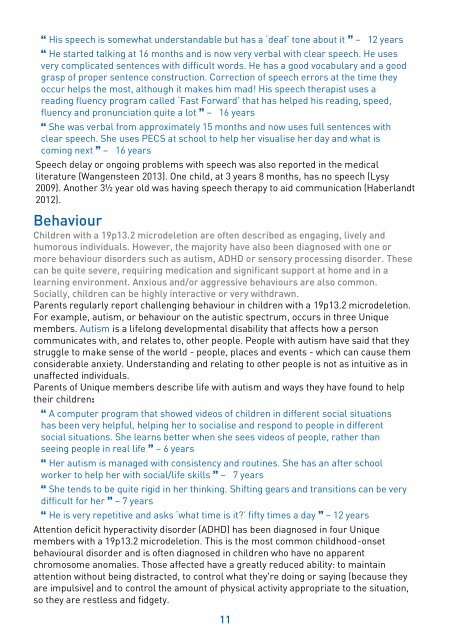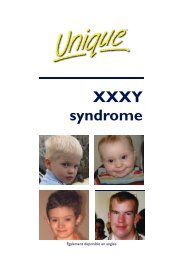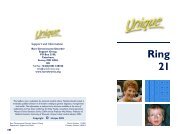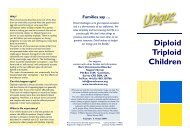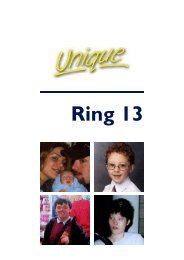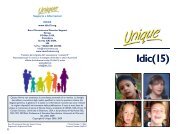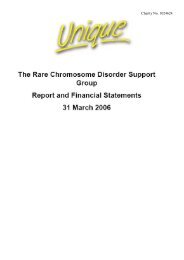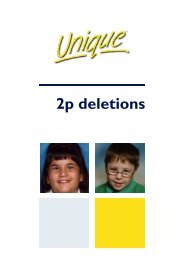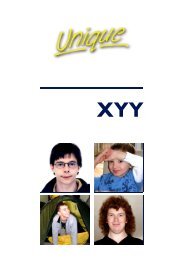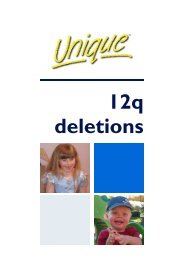19p13.2 microdeletions - Unique The Rare Chromosome Disorder ...
19p13.2 microdeletions - Unique The Rare Chromosome Disorder ...
19p13.2 microdeletions - Unique The Rare Chromosome Disorder ...
You also want an ePaper? Increase the reach of your titles
YUMPU automatically turns print PDFs into web optimized ePapers that Google loves.
His speech is somewhat understandable but has a ‘deaf’ tone about it – 12 years<br />
He started talking at 16 months and is now very verbal with clear speech. He uses<br />
very complicated sentences with difficult words. He has a good vocabulary and a good<br />
grasp of proper sentence construction. Correction of speech errors at the time they<br />
occur helps the most, although it makes him mad! His speech therapist uses a<br />
reading fluency program called ‘Fast Forward’ that has helped his reading, speed,<br />
fluency and pronunciation quite a lot – 16 years<br />
She was verbal from approximately 15 months and now uses full sentences with<br />
clear speech. She uses PECS at school to help her visualise her day and what is<br />
coming next – 16 years<br />
Speech delay or ongoing problems with speech was also reported in the medical<br />
literature (Wangensteen 2013). One child, at 3 years 8 months, has no speech (Lysy<br />
2009). Another 3½ year old was having speech therapy to aid communication (Haberlandt<br />
2012).<br />
Behaviour<br />
Children with a <strong>19p13.2</strong> microdeletion are often described as engaging, lively and<br />
humorous individuals. However, the majority have also been diagnosed with one or<br />
more behaviour disorders such as autism, ADHD or sensory processing disorder. <strong>The</strong>se<br />
can be quite severe, requiring medication and significant support at home and in a<br />
learning environment. Anxious and/or aggressive behaviours are also common.<br />
Socially, children can be highly interactive or very withdrawn.<br />
Parents regularly report challenging behaviour in children with a <strong>19p13.2</strong> microdeletion.<br />
For example, autism, or behaviour on the autistic spectrum, occurs in three <strong>Unique</strong><br />
members. Autism is a lifelong developmental disability that affects how a person<br />
communicates with, and relates to, other people. People with autism have said that they<br />
struggle to make sense of the world - people, places and events - which can cause them<br />
considerable anxiety. Understanding and relating to other people is not as intuitive as in<br />
unaffected individuals.<br />
Parents of <strong>Unique</strong> members describe life with autism and ways they have found to help<br />
their children:<br />
A computer program that showed videos of children in different social situations<br />
has been very helpful, helping her to socialise and respond to people in different<br />
social situations. She learns better when she sees videos of people, rather than<br />
seeing people in real life – 6 years<br />
Her autism is managed with consistency and routines. She has an after school<br />
worker to help her with social/life skills – 7 years<br />
She tends to be quite rigid in her thinking. Shifting gears and transitions can be very<br />
difficult for her – 7 years<br />
He is very repetitive and asks ‘what time is it?’ fifty times a day – 12 years<br />
Attention deficit hyperactivity disorder (ADHD) has been diagnosed in four <strong>Unique</strong><br />
members with a <strong>19p13.2</strong> microdeletion. This is the most common childhood-onset<br />
behavioural disorder and is often diagnosed in children who have no apparent<br />
chromosome anomalies. Those affected have a greatly reduced ability: to maintain<br />
attention without being distracted, to control what they're doing or saying (because they<br />
are impulsive) and to control the amount of physical activity appropriate to the situation,<br />
so they are restless and fidgety.<br />
11


